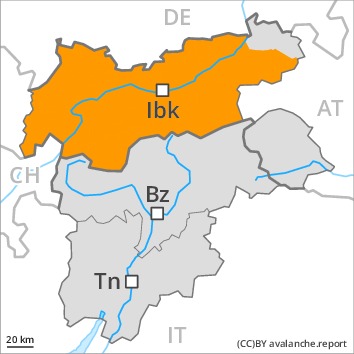
Danger level
Avalanche Problem
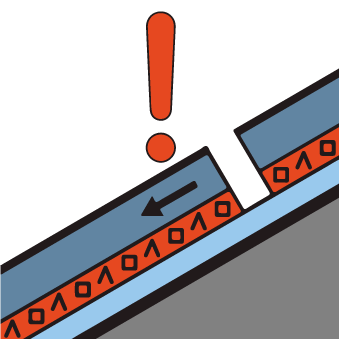 | | Persistent weak layer |
| 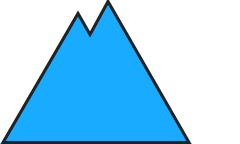 | |  |
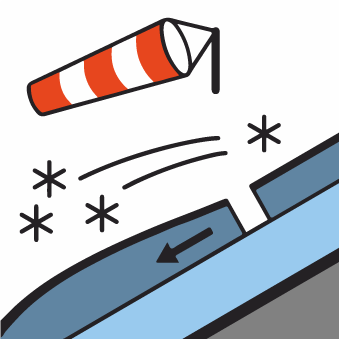 | | Wind-drifted snow |
| 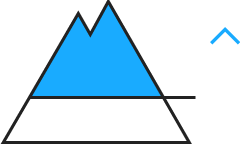 | |  |

Weakly bonded old snow requires caution. Wind slabs are to be evaluated critically.
Avalanches can in some cases be released in deep layers and reach large size in isolated cases, this also applies in areas close to the tree line. Remotely triggered avalanches are possible. Natural avalanches are possible, in particular on steep shady slopes in the regions exposed to the foehn wind.
As a consequence of a sometimes storm force wind from southerly directions, sometimes avalanche prone wind slabs will form. Avalanches can be released, even by a single winter sport participant and reach medium size, especially on west, north and east facing slopes above the tree line. The number and size of avalanche prone locations will increase with altitude.
Caution and restraint are important.
Snowpack
dp.5: snowfall after a long period of cold
dp.6: cold, loose snow and wind
The old snowpack is faceted. Whumpfing sounds and the formation of shooting cracks when stepping on the snowpack and stability tests confirm the unfavourable bonding of the snowpack. The sometimes storm force wind will transport the snow. In some places new snow and wind slabs are lying on surface hoar. Some snow will fall in particular along the border with Italy.
Tendency
The avalanche danger will persist.
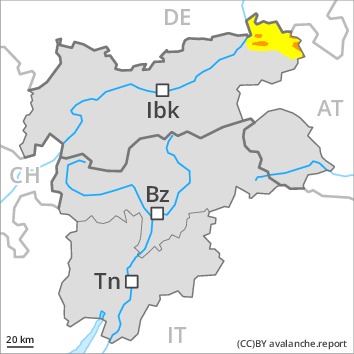
Danger level
 | treeline
|
Avalanche Problem
 | | Wind-drifted snow |
|  | |  |
 | | Wind-drifted snow |
| 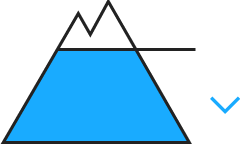 | |  |

Fresh wind slabs require caution.
As a consequence of a sometimes storm force wind from southerly directions, sometimes avalanche prone wind slabs will form. Avalanches can in some places be released, even by a single winter sport participant and reach medium size, especially on steep west, north and east facing slopes above the tree line, as well as on steep shady slopes below the tree line. The number and size of avalanche prone locations will increase with altitude.
Snowpack
dp.6: cold, loose snow and wind
As a consequence of a strong wind from southerly directions, sometimes avalanche prone wind slabs will form in particular on west, north and east facing slopes. In isolated cases wind slabs are lying on a weakly bonded old snowpack, in particular on shady slopes also in areas close to the tree line. As a consequence of mild temperatures the snowpack will settle.
Tendency
The avalanche danger will persist.
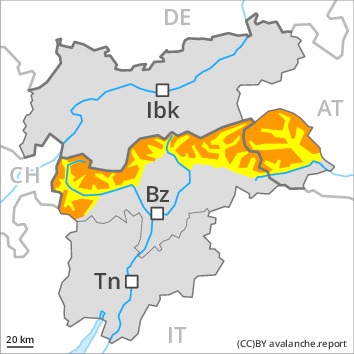
Danger level
 | treeline
|
Avalanche Problem
 | | Wind-drifted snow |
|  | |  |
 | | Persistent weak layer |
|  | |  |

Fresh wind slabs require caution. Weakly bonded old snow requires caution.
The more recent wind slabs can be released easily in all aspects above the tree line, especially at their margins. In addition the hard wind slabs are capable of being triggered in isolated cases still.
Avalanches can in some cases be triggered in deep layers and reach large size. Caution is to be exercised in all aspects also in areas close to the tree line. The avalanche prone locations are sometimes covered with new snow and are difficult to recognise.
Gliding avalanches are possible.
Caution and restraint are important.
Snowpack
dp.6: cold, loose snow and wind
dp.5: snowfall after a long period of cold
In some regions up to 10 cm of snow, and even more in some localities, will fall. As a consequence of a strong wind from southwesterly directions, further wind slabs will form. The brittle wind slabs are lying on the unfavourable surface of an old snowpack. The old snowpack is faceted; its surface is loosely bonded and consists of surface hoar and faceted crystals. Whumpfing sounds and the formation of shooting cracks when stepping on the snowpack and field observations confirm poor snowpack stability.
Tendency
Fresh wind slabs require caution.
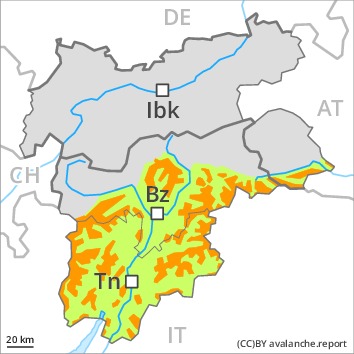
Danger level
 | treeline
|
Avalanche Problem
 | | Wind-drifted snow |
|  | |  |
 | | Persistent weak layer |
|  | |  |

Wind slabs and weakly bonded old snow are to be critically assessed.
The fresh and somewhat older wind slabs can in some cases be released easily. In addition the hard wind slabs are capable of being triggered. The prevalence of the avalanche prone locations will increase at high altitude and in the high Alpine regions.
In some places avalanches can be triggered in the faceted old snow and reach large size in some cases. This applies in particular above the tree line.
At low and intermediate altitudes individual gliding avalanches are possible. In steep terrain there is a danger of falling on the hard snow surface. Restraint is recommended.
Snowpack
dp.6: cold, loose snow and wind
dp.8: surface hoar blanketed with snow
In some regions up to 10 cm of snow will fall. As a consequence of a sometimes strong wind from southwesterly directions, sometimes easily released wind slabs will form. Various wind slab layers are lying on soft layers. Places where surface hoar has been covered with snow are especially precarious. Towards its base, the snowpack is well consolidated.
Tendency
Fresh wind slabs are to be evaluated with care and prudence.















